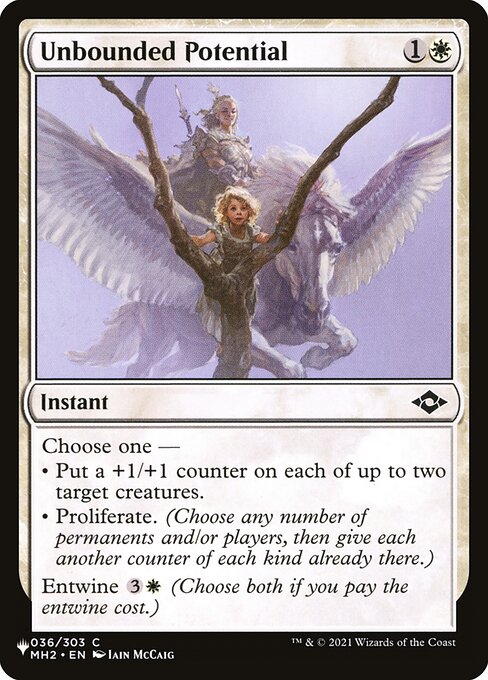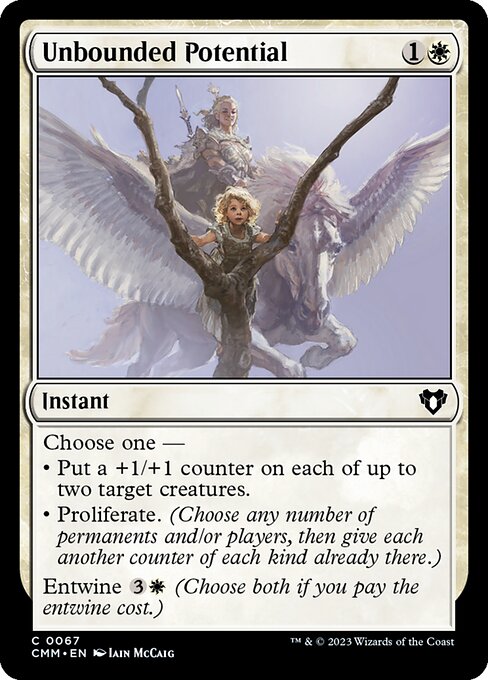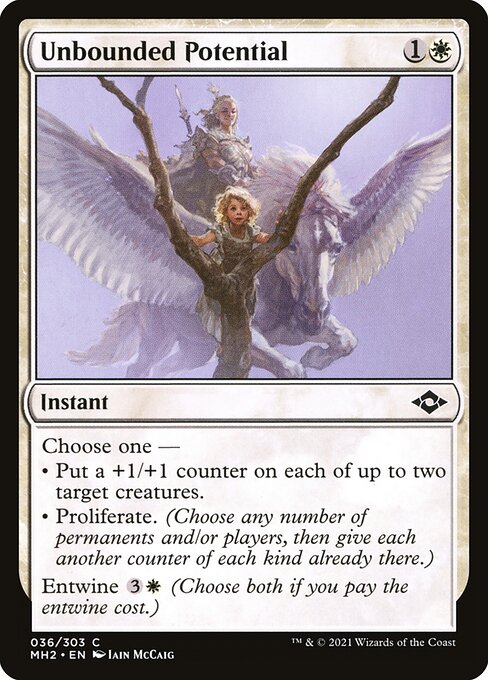Potencial sin límites
Instantáneo
Elige uno:
• Pon un contador +1/+1 sobre cada una de hasta dos criaturas objetivo.
• Prolifera. (Elige cualquier cantidad de permanentes y/o jugadores, luego pon sobre cada uno un contador de cada tipo que ya tenga.)
Entrelazar . (Si pagas el coste de entrelazar, elige ambas opciones.)
• Pon un contador +1/+1 sobre cada una de hasta dos criaturas objetivo.
• Prolifera. (Elige cualquier cantidad de permanentes y/o jugadores, luego pon sobre cada uno un contador de cada tipo que ya tenga.)
Entrelazar . (Si pagas el coste de entrelazar, elige ambas opciones.)
standard
future
historic
gladiator
pioneer
explorer
modern
legacy
pauper
vintage
penny
commander
brawl
alchemy
paupercommander
duel
oldschool
premodern
Rulings
You don't have to choose every permanent or player that has a counter, only the ones you want to add another counter to. Since “any number” includes zero, you don't have to choose any permanents at all, and you don't have to choose any players at all.
While proliferating, if you choose a permanent or player with multiple kinds of counters, the permanent or player gets another counter of each kind, not just one kind. This change from the original proliferate rules was introduced in a previous set.
Players can respond to a spell or ability whose effect includes proliferating. Once that spell or ability starts to resolve, however, and its controller chooses which permanents and players will get new counters, it's too late for anyone to respond.
If you cast this spell by paying its entwine cost, you will be able to proliferate the counters that you placed with the first mode.
If a permanent has +1/+1 counters and -1/-1 counters on it, they're removed in pairs as a state-based action so that the permanent has only one of those kinds of counters (or none of either kind of counters) on it.
To proliferate, you can choose any permanent that has a counter, including ones controlled by opponents, and you can choose any player who has a counter, including opponents. You can't choose cards in any zone other than the battlefield, even if they have counters on them.
While proliferating, if you choose a permanent or player with multiple kinds of counters, the permanent or player gets another counter of each kind, not just one kind. This change from the original proliferate rules was introduced in a previous set.
Players can respond to a spell or ability whose effect includes proliferating. Once that spell or ability starts to resolve, however, and its controller chooses which permanents and players will get new counters, it's too late for anyone to respond.
If you cast this spell by paying its entwine cost, you will be able to proliferate the counters that you placed with the first mode.
If a permanent has +1/+1 counters and -1/-1 counters on it, they're removed in pairs as a state-based action so that the permanent has only one of those kinds of counters (or none of either kind of counters) on it.
To proliferate, you can choose any permanent that has a counter, including ones controlled by opponents, and you can choose any player who has a counter, including opponents. You can't choose cards in any zone other than the battlefield, even if they have counters on them.
Rulings
You don't have to choose every permanent or player that has a counter, only the ones you want to add another counter to. Since “any number” includes zero, you don't have to choose any permanents at all, and you don't have to choose any players at all.
While proliferating, if you choose a permanent or player with multiple kinds of counters, the permanent or player gets another counter of each kind, not just one kind. This change from the original proliferate rules was introduced in a previous set.
Players can respond to a spell or ability whose effect includes proliferating. Once that spell or ability starts to resolve, however, and its controller chooses which permanents and players will get new counters, it's too late for anyone to respond.
If you cast this spell by paying its entwine cost, you will be able to proliferate the counters that you placed with the first mode.
If a permanent has +1/+1 counters and -1/-1 counters on it, they're removed in pairs as a state-based action so that the permanent has only one of those kinds of counters (or none of either kind of counters) on it.
To proliferate, you can choose any permanent that has a counter, including ones controlled by opponents, and you can choose any player who has a counter, including opponents. You can't choose cards in any zone other than the battlefield, even if they have counters on them.
While proliferating, if you choose a permanent or player with multiple kinds of counters, the permanent or player gets another counter of each kind, not just one kind. This change from the original proliferate rules was introduced in a previous set.
Players can respond to a spell or ability whose effect includes proliferating. Once that spell or ability starts to resolve, however, and its controller chooses which permanents and players will get new counters, it's too late for anyone to respond.
If you cast this spell by paying its entwine cost, you will be able to proliferate the counters that you placed with the first mode.
If a permanent has +1/+1 counters and -1/-1 counters on it, they're removed in pairs as a state-based action so that the permanent has only one of those kinds of counters (or none of either kind of counters) on it.
To proliferate, you can choose any permanent that has a counter, including ones controlled by opponents, and you can choose any player who has a counter, including opponents. You can't choose cards in any zone other than the battlefield, even if they have counters on them.
Votre collection ? vos decks ?
Envie de gérer votre collection et/ou créer des decks ?



 0
0
 0.10€
0.10€
